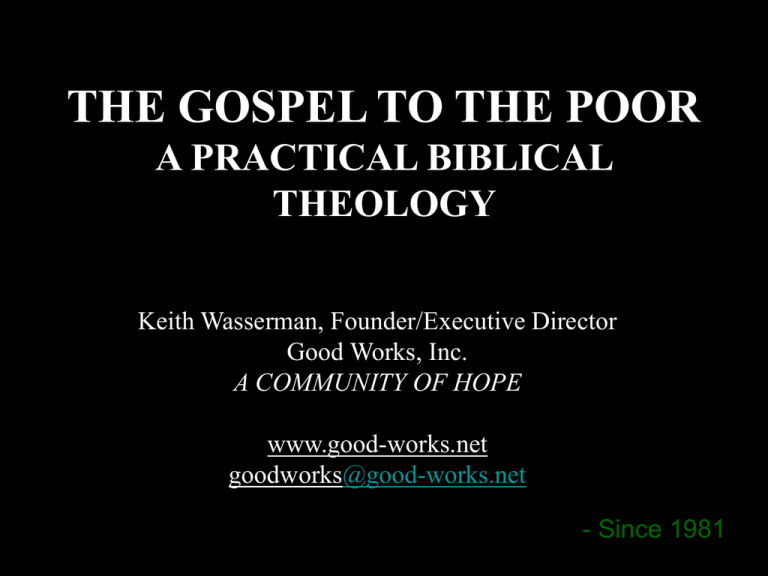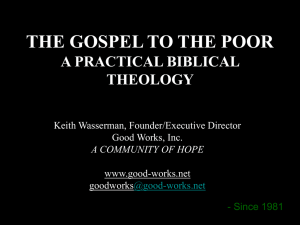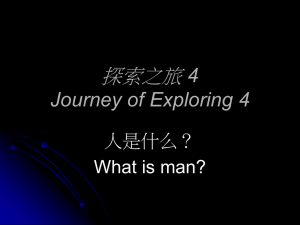Practical Biblical theology on serving the poor1
advertisement

THE GOSPEL TO THE POOR A PRACTICAL BIBLICAL THEOLOGY Keith Wasserman, Founder/Executive Director Good Works, Inc. A COMMUNITY OF HOPE www.good-works.net goodworks@good-works.net - Since 1981 Loving God & our neighbor Luke 9:27 1.Getting bitten is a part of the normal Christian life. 2. Ministry with hurting people is impossible except through community. 3. Being on the front lines require learning from others’ mistakes. 4. Denying our pain does not work. It eventually comes back to haunt us. 5. Forgiveness is the centerpiece of the gospel. Two eye glasses Great Commission (Matthew 28:19) Great Commandment (Luke 10:27 & John 15:17) That’s why we need to be … • Luke 4:18-19 “ The Spirit of the Lord is upon me because the Lord has anointed me to bring good news to the poor. He has sent me to heal the broken hearted and to proclaim liberty to the captives and recovery of sight to the blind and to proclaim the year of the Lord’s favor” Anointed - “the special grace from God to persevere in love with those who are often ungrateful and unresponsive” 1. Where does this grace come from ? 2. How do we sustain it? 3. How does Jesus see the poor? Then Jesus said to his host. “When you give a luncheon or dinner, do not invite your friends, your brothers or relatives, or your rich neighbors; if you do, they may invite you back and so you will be repaid. But when you give a banquet, invite the poor, the crippled, the lame, the blind, and you will be blessed. Although they cannot repay you, you will be repaid at the resurrection of the righteous.” – Luke 14:12 As Jesus went on from there, he saw a man named Matthew sitting at the tax collector’s booth. “Follow me,” he told him, and Matthew got up and followed him. While Jesus was having dinner at Matthew’s house, many tax collectors and “sinners” came and ate with him and his disciples. When the Pharisees saw this, they asked his disciples “Why does your teacher eat with tax collectors and ‘sinners’? On hearing this, Jesus said, “It is not the healthy who need a doctor, but the sick. But go and learn what this means: I desire mercy, not sacrifice. For I have not come to call the righteous, but sinners”. – Matthew 9:9-13 This requires (1) A lifestyle of hospitality (2) A willingness to lay down our SOCIAL LIFE (3) A willingness to get “bitten” ( see Philippians 3:10 and I Peter 4:1) (4) letting our need to be appreciated DIE REMEMBER THIS: It is always and only about the Kingdom of God! A word about me • Coming to Christ @ the age of 17 – a comprehensive rescue! WORSHIP FELLOWSHIP DISCIPLESHIP EVANGLISM A calling vs a concern The gift of naivety Information verses impartation “In-formation verses Impartation” “practice makes _______ // Roses are red, _________ (Can you think of any other phrases like that in contemporary English language? “The poor you will have with you always (Mark 14:7), therefore….. (People knew the law, they know how to finish that statement” Deuteronomy 15:11 “There will always be poor people in the land, therefore, I command you to be open-handed towards your brothers and towards the poor and needy in your land” Remember: The Holy Spirit is our teacher (John 16:12-15) Do most Christians agree that evangelism with the poor should be a priority? • Our priorities as Christians are revealed by our preparations. If the followers of Jesus believe the ministry of evangelism with the poor is a priority, this is revealed as ministry to the poor competes in the arena of other priorities -- church budget, Sunday morning worship, youth ministry, sermon topics, leadership development and how Christians use their time outside of church meetings. Priorities are also revealed in fruitfulness. Are there poor people involved in the body life? Is your community a “safe place” for people in poverty? • If we ask "Is the Church prepared to evangelize the poor?", I wonder. While I observe a wide range of relief work-- meeting immediate needs (primarily food and clothing), I see little effort beyond 'relief‘ to the deeper issues of evangelism, rehabilitation, and development – addressing the root issues of poverty and oppression. While there may be a handful of church members who have passion to care for the poor, I see so few church governments whose priorities reveal this. As I see through a glass dimly, Christian culture has had far more power to determine the priorities of the church than scripture. Even as scripture teaches over and over the necessity of loving the poor, and bringing good news to the poor, it is being silenced by the overwhelming example of what believers actually do. When a contradiction between what scripture says and what believers model occurs, our Christian culture pressures new believers to tame their view of scripture to the examples they see. GOOD WORKS – The outward expression of the inward change (Eph 2:10) – Our good works glorify God (Matthew 5:16) – Jesus went about doing good and healing (Acts 10:38) – We overcome evil with good (Romans 12:21) (See also I Timothy 6:18, Galatians 6:7-10, Jeremiah 22:16 & Titus 3:1) Luke 10: 25-37 – THE GOOD … ? • • • • Loving God & loving our neighbors How Jesus defines the problem The obstacles of busyness & theology The necessity of getting messy Evangelism with the poor “ But you will receive power when the Holy Spirit comes on you; and you will be my witnesses in Jerusalem, and in all Judea and Samaria and to the ends of the earth” – Acts 1:8 • • “What you are speaks so loud, I can not hear a word you are saying” “You may be the only book about Jesus that some people will ever read” Acts 1:8 II Timothy 4:5 Acts 4:20 Acts 5:20 LOVING OUR NEIGHBOR BEGINS IN OUR NEIGHBORHOOD. We are either a good witness or bad witness. EVANGELISM THROUGH THE BACK DOOR – Unity! • Being the body (John 17:20-21) • Welcoming not-yet Christians as to serve with us. • Walking out “being reconciled” with one-another THE FOUR PRINCIPALS • Earn the right to speak • Get permission • Always use respect as the primary lens through which you speak • Pray: Ask God what work of the Holy Spirit is already going on in this person’s life . Use discernment “Preach the gospel all the time, sometimes use words” - St. Francis of Assisi Plowing is a spiritual act of worship. John the Baptist gave his life to prepare people to receive Jesus “A poor man is shunned by all his relatives– how much more do his friends avoid him! Though he pursues them with pleading, they are nowhere to be found” – Proverbs 19:7 Questions to consider: 1. Who are “the poor” ? 2. How do we bring good news to the poor in the 21st century? • The gospel must be good news for us before it will ever be good news for them. The gospel is not about information; it is about TRANSFORMATION!! (Romans 1:16) • The gospel must be overflow (Ps 23:5/ Col. 2:7) • The gospel must be both proclamation and demonstration (Matthew 10:5-10) MATTHEW 9:35-38 Jesus went through all the towns and villages, teaching in their synagogues, preaching the good news of the kingdom and healing every disease and sickness. When he saw the crowds, he had compassion on them, because they were harassed and helpless, like sheep without a shepherd. Then he said to his disciples, “The harvest is plentiful but the workers are few. Ask the Lord of the harvest therefore to send out workers into his harvest field” – Matthew 9:35-38 Principals from Matthew 9:35-38 1. Jesus reached out beyond the ‘system’ to where people were – he went to the multitudes. 2. The good news of the kingdom will always involve healing of some kind. 3. SEEING the multitudes (as God does) will bring compassion in us. 4. We must wrestle with WHO or WHAT is harassing them if we are going to help them! 5. We must wrestle with WHO is helpless in our community and why. Q How do you bring good news to the poor in the 21st century? A – By creating a ‘context’ (a venue) – a way for the good news to engage the people, to intersect with the lives of those in need marked by grace – a grace to participate, to freely receive and a grace to reject! Each ‘context’ will open up new relationships for those serving and those being served. Principals of evangelism inside a “context” assess and adapt assess and adapt assess and adapt and.. • Always seek to do the thing that builds trust! • Meet the felt need ( clothes, food, cars, housing, support) • Err to the side of mercy. Mercy triumph’s over judgment (James 2:12 • Pray/Ask “Lord, what are you doing already” and then get in line with that. Use discernment! • Get permission which communicates respect. • Always take the posture of being teachable (I Peter 5:5) Personal choices vs. “Systemic” sin Personal choices -Proverbs 6:9-11 -Proverbs 10:4 -Proverbs 11:3 -Proverbs 13:18 -Proverbs 14:23 -Proverbs 20:4 -Proverbs 21:25 -Proverbs 24:33-34 Systemic “sin” -Proverbs 13:23 -Proverbs 14:20 -Proverbs 19:3-4 & 7 -Exodus 1:8-22 -Psalm 10:8-9 -Isaiah 10:-1-2* -Amos 5:11-12 -Luke 15:14* -Ecclesiastes 5:8-9 “How long will you defend the unjust and show partiality to the wicked? Defend the cause of the weak and fatherless; maintain the rights of the poor and oppressed, rescue the weak and needy; deliver them from the hand of the wicked” – Psalm 82:2-3 Luke 14:12 Then Jesus said to his host. “When you give a luncheon or dinner, do not invite your friends, your brothers or relatives, or your rich neighbors; if you do, they may invite you back and so you will be repaid. But when you give a banquet, invite the poor, the crippled, the lame, the blind, and you will be blessed. Although they cannot repay you, you will be repaid at the resurrection of the righteous.” Part 1 With whom is God concerned? Scripture study on the widow, fatherless and stranger • Psalm 10:14 (helper of the fatherless) & 68:5, (defender of widows) • Exodus 22:21-24 = Commands to the people of God to – Not mistreat or oppress strangers – Not take advantage of a widow or an orphan • Leviticus 19:34 & 25:35 – Treat the stranger as you would the 'local' – Help the 'locals' as you would a stranger • Deuteronomy 10:18 – God defends the cause of the fatherless, widow and orphan. We are to love the strangers and fear the Lord. • Deuteronomy 14:28-29 – Strangers, fatherless, widows and Levites are grouped together so that they all may glean. When THEY glean, we are blessed. The Levites had no allotment or inheritance of their own. • Deuteronomy 15:7-11 – "Do not be hard-hearted or tightfisted. Do not harbor this wicked thought – God listens carefully to these people: "he may appeal to the Lord… – There will always be poor in the land, THEREFORE…. I command you to be OPENHANDED Part 2 With whom is God concerned? Scripture study on the widow, fatherless and stranger • Deuteronomy 24:17-18 – Do not deprive the alien (stranger), or the fatherless of justice – Do not take the cloak of the widow as a pledge – Remember: You were once in this situation!!! That is why God COMMANDS this! • Deuteronomy 26:12 – The 'set-aside' was for the Levite, the alien, the fatherless and the widow so that they may eat. • Deuteronomy 27:19 – There is a curse upon the person who WITHHOLDS justice from the alien, fatherless or widows • Deuteronomy 31:12 – Include the alien (stranger) in your gatherings (assemblies) SO THAT they can fear the Lord and follow carefully all the word of this law. • Proverbs 15:25 – The Lord tears down the proud man's house but he keeps the widow's boundaries intact • Proverbs 23:10 – God seems to be very concerned about the boundaries of the fatherless. "Their defender is strong and he will take up their case against the one who encroaches on their fields • Other scriptures to consider: Isaiah 1:17, James 1:27, Job 29:12-17 Jeremiah 7:6-7 & 49:11 Matthew 25:31-46 A look at the poor through the lens of the Proverbs: Proverbs 10:15, 13:23, 14:31, 17:5, 18:11, 19:4 & 7 & 17, 21:13, 22:9 & 16 & 22, 23:20 & 21, 24:11-12, 28:3 & 5 & 27, 29:7, 30:7-9, 31:4-9.









